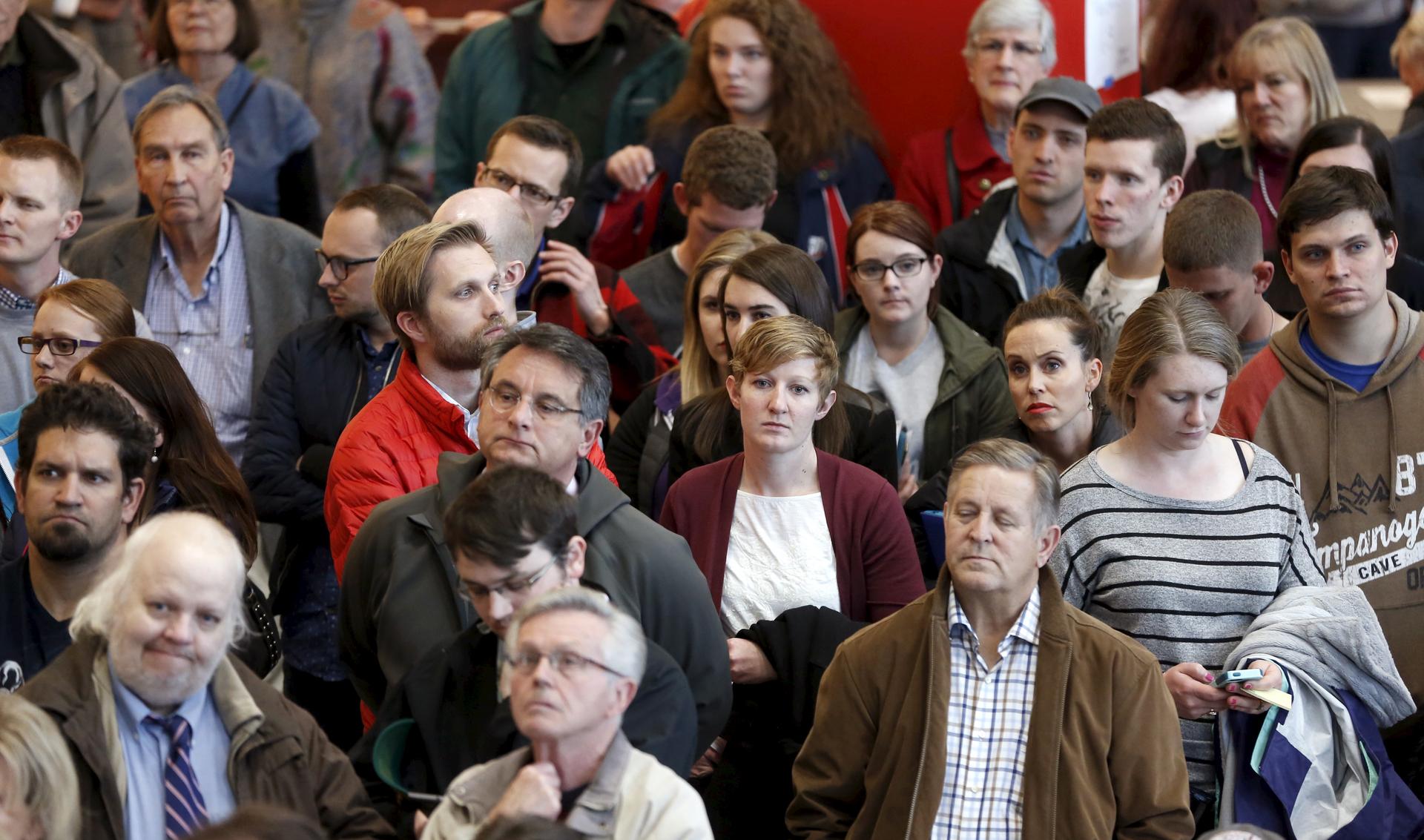In largely Mormon communities around the West, religion, environmental awareness, and politics are all intertwined
Voters attend a Republican US presidential caucus in Salt Lake City, Utah, March 22, 2016.
When Republican Nominee Mitt Romney ran for president in 2012, he was the first Mormon candidate to lead a major party’s ticket. The LDS Enclaves in and around Utah and the Intermountain West rejoiced, giving Romney 74 percent of their vote.
The LDS Enclaves are home to about 3 million people across 41 counties in and around Utah, according to the American Communities Project (ACP). The ACP has charted every single county in the United States based on a demographic profile (see map above), something that is revealing as the 2016 election approaches. LDS Enclaves are remarkably homogenous areas — 9 in 10 residents are white — and The Beehive State has one of the highest fertility rates in the country, 31 percent of residents are under the age of 18.
Though Mormons are the most conservative and the most Republican of any major religious groups in the United States, today many are hesitant to support GOP nominee Donald Trump. While many Utah voters are concerned about Trump’s comments about groping women, others are also thinking of the long-term challenges facing the state as Election Day approaches.
“Salt Lake City and parts of Utah have some of the worst air quality in the world,” says Lindsay Hansen Park, a 34-year-old Utah native and Mormon who works for a non-profit in Salt Lake. “Everybody knows about it, everybody complains about it, and yet when there is any sort of political action trying to be taken — there are a lot of political organizations that have tried to enact change — Mormon politicians really fight back on that if they feel that any sort of big government [or] federal government regulations are going to come in. I don’t think Mormons are as concerned about sustainable environment change as they are the fear of their freedoms and their rights being taken away.”
But Park says that the reason for inaction runs deeper than conservative concerns about big government. It’s based in the Mormon belief that Jesus Christ will return to earth.
“As far as environmental issues, a lot of Mormons, although they might not admit this publicly, don't really think the world’s gonna be around that long to be destroyed,” she says. “I think that belief really stops us from worrying about sustainable action for the environment because our faith tells us that God is going to take care of it.”
Issues of religion, environmental awareness, and politics are all intertwined in the LDS Enclaves of Utah.
“On one hand we have a very conservative LDS governor, Gary Herbert,” Park explains. “He’s publicly waged a war on pornography. He’s called it a national health crisis, he’s used it as a platform to, what I would consider, project his religious views on the status of our state. There are a lot of people who say, “Why aren’t we dealing with [an] actual health crisis — the quality of air.””
Though Park lives in an historically red state, her views have become more liberal over time, which is part of why she moved from a more rural town in Utah back to Salt Lake City to raise her children.
“We actually moved because my house was getting vandalized by fundamentalists,” she says. “Living in a rural area that is predominately Mormon worked for us for a long time, but once my husband and I became a little bit more liberal in our beliefs and started openly supporting gay marriage and things like that, it became increasingly difficult.”
Though Mormons are relatively liberal when it comes to immigration, and they feel very strongly that everyone should have the right to religious freedom, a 2009 Pew poll showed that 70 percent of Mormons believe abortion should be illegal in all or most cases, and 68 percent say homosexuality should be discouraged. A 2010 Gallup poll showed that Mormons are also overwhelmingly devout — 79 percent of Mormons attend religious services weekly, almost every week, or monthly. This is the highest self-reported church attendance of any major religious groups.
“Our son, who had grown up in [our rural town] since he was a baby, his friends started distancing themselves because their parents didn’t agree with some of our politics,” Park says. “That was difficult for our family. We decided to have a fresh start and move to an area that I felt community in and that I felt my kids would have a little more access to diverse opinions and diverse beliefs and diverse religions.”
Salt Lake City has been an improvement for Park and her family, but the friction between religiously-influenced politics and liberal factions remains. However, Park says that friction doesn’t necessarily translate to the ballot box.
“For example, Utah has very strict liquor laws that are definitely influenced by LDS, Mormon beliefs,” she says. “You’ll have a lot of people upset with that, and resentful of the church for that. And yet, they will align themselves with LDS beliefs and LDS politics on things like, maybe, abortion or family planning or abstinence only [education].”
When Brigham Young, the founder of the LDS and one of the religion’s prophets, arrived in the Salt Lake Valley, he said, “It is enough.” Though it seems unlikely that Park will ever leave, despite having faced significant opposition to her changing beliefs in a very homogenous region, she’s found her own niche.
“It’s hard to tell if Salt Lake City’s changed or if my worldview has expanded,” she says. “I think the counterculture in Utah has become a more seductive and alluring culture to mainstream people, especially if they feel alienated by more of the religious or conservative laws here.”
This story was first published by The Takeaway. See more of their stories from the series, Portrait of An American Voter.
